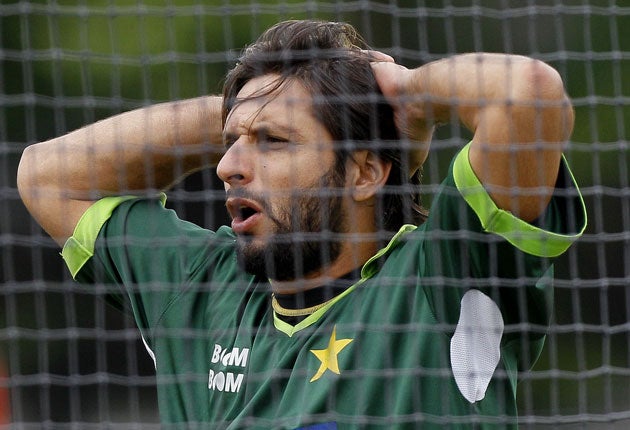Rajan's Wrong 'Un: Afridi's row sparks yet more politics and palaver in Pakistan
Afridi can be prickly but the significance of this lies in the continuation of a sordid pattern.

Is there anything more farcical in cricket than the politicking of the Pakistani dressing room? That cursed chamber makes the court of Nicholas II look like playschool. The latest imbroglio to emerge from it, and so inevitably bring the Pakistan Cricket Board into disrepute, concerns the boisterous former national captain, Shahid Afridi.
Last night Afridi flew back to Karachi from London, to try to rescue his career. He was met by giant billboards, erected by adoring fans including a hitherto unknown "Pakistan cricket lovers' forum". A giant image of Afridi in the lime green national kit sat atop a declaration that he is the "pride of Pakistan". One of his predecessors as captain told The Times of India: "It is a big sign that Afridi has geared up for a long legal and otherwise battle with the board, in order to come out of the ongoing controversy with his reputation unharmed."
Some chance. Afridi has been summoned to a three-man PCB disciplinary committee in Lahore on 8 June to face charges that he has breached two clauses of the code of conduct. The PCB don't like how he announced his retirement last Monday (in protest at their mismanagement), and have taken umbrage at his scathing attack on the board, the national selectors, team coach Waqar Younis, and manager Intikhab Alam.
Afridi has accepted that he breached the code, but refuses to apologise. The PCB demand he say sorry. So Afridi appealed directly to the country's president, Asif Ali Zardari – who is patron of the PCB. In London he has allegedly held meetings with Zardari's son, Bilawal Bhutto, and former prime minister Nawaz Sharif. Interior Minister Rehman Malik has also ventilated his view in public.
What a palaver. Can you imagine Andrew Strauss flying home from Pakistan to be paraded in front of the ECB because cricketwallahs here demanded an apology – with David Cameron, Theresa May, and Gordon Brown leaning into the affair too? Afridi can be a prickly and outrageous character: he once tried to tamper with a ball by biting it. But the deeper significance of this affair lies in its continuation of a sordid, sickening pattern.
Between the retirement of Imran Khan in 1992 and the start of 2011, Pakistan have had fourteen one-day captains in nineteen years (with a criteria being leading the team in more than five internationals). In the same time, England had 11, Zimbabwe ten, West Indies and New Zealand nine, Australia eight, India seven, and South Africa and Sri Lanka six.
During this period, and now with a criteria of over three internationals, Pakistan have had 14 captains in Tests, while England have had seven, Sri Lanka and India six, and New Zealand and Australia five. In other words, the Pakistan captain's armband is often a very temporary adornment. Instability breeds inconsistency, and this churn has been deleterious not just to the captains who receive the poisoned chalice, but their players too.
The list of Pakistanis who promised greatness but didn't deliver is painfully long; and that's without the sorry addition of those implicated in match-fixing, not just in England last year but in the late Nineties too.
The problem is one of culture. A senior player with knowledge of the Pakistani game told me last year: "It's not so much the system is corrupt, as corruption is the system." Political interference is constant, and many players are from poor families and therefore susceptible to blackmail, which is far more prevalent than fans realise.
Afridi has a fanbase, and can look after himself; but many other victims suffer in silence. In a nuclear-armed country ruled by a recalcitrant military class, corruption in cricket rids the country of an opportunity for hope. If Afridi is Pakistan's pride, this affair only adds to the shame.
Amol Rajan's "Twirlymen: The Unlikely History of Cricket's Greatest Spin Bowlers" is published by Yellow Jersey Press
Subscribe to Independent Premium to bookmark this article
Want to bookmark your favourite articles and stories to read or reference later? Start your Independent Premium subscription today.

Join our commenting forum
Join thought-provoking conversations, follow other Independent readers and see their replies